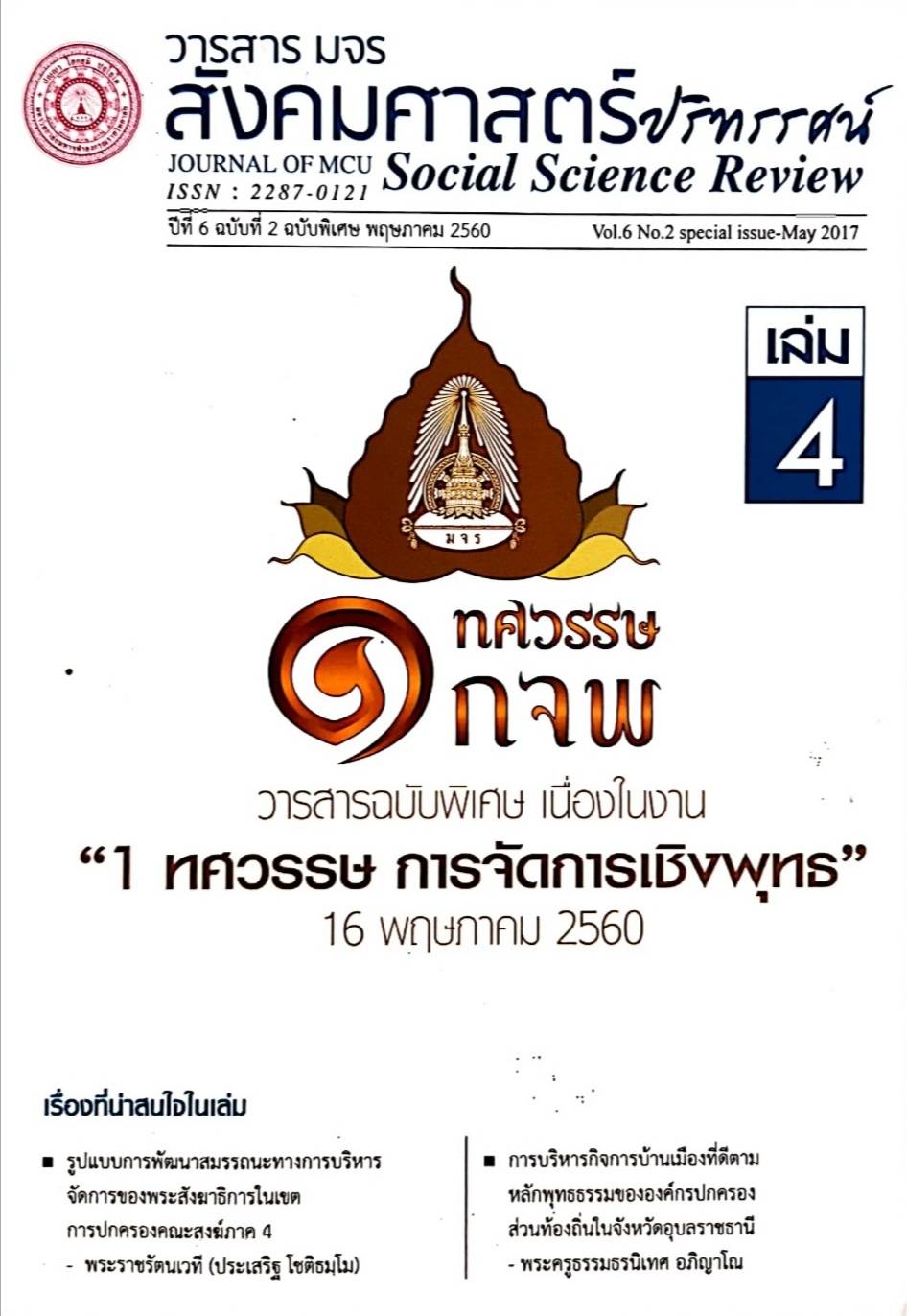การพัฒนาคุณลักษณะภาวะผู้นามุ่งให้บริการของผู้บริหาร องค์กรปกครองส่วนท้องถิ่นในจังหวัดเพชรบูรณ์ตามแนวพุทธธรรม
คำสำคัญ:
การพัฒนา, คุณลักษณะภาวะผู้นา, มุ่งให้บริการ, องค์กรปกครองส่วนท้องถิ่น, พุทธธรรมบทคัดย่อ
บทความวิจัยนี้ มีวัตถุประสงค์ 1) เพื่อศึกษาคุณลักษณะภาวะผู้นามุ่งให้บริการของ
ผู้บริหารองค์กรปกครองส่วนท้องถิ่นในจังหวัดเพชรบูรณ์ 2) เพื่อศึกษาความสัมพันธ์ระหว่างหลักทุติย
ปาปณิกธรรมกับคุณลักษณะภาวะผู้นามุ่งให้บริการของผู้บริหารองค์กรปกครองส่วนท้องถิ่นในจังหวัด
เพชรบูรณ์ 3) เพื่อศึกษาแนวทางการพัฒนาคุณลักษณะภาวะผู้นามุ่งให้บริการของผู้บริหารองค์กร
ปกครองส่วนท้องถิ่นในจังหวัดเพชรบูรณ์ตามแนวพุทธธรรม
ผลการวิจัย พบว่า
1. คุณลักษณะภาวะผู้นามุ่งให้บริการของผู้บริหารองค์กรปกครองส่วนท้องถิ่นในจังหวัด
เพชรบูรณ์ โดยภาพรวมอยู่ในระดับมาก มีค่าเฉลี่ยเท่ากับ เมื่อพิจารณาเป็นรายด้านพบว่า ด้านการ
ให้บริการอยู่ในระดับปานกลาง มีค่าเฉลี่ยเท่ากับ ส่วนด้านอื่นๆ อยู่ในระดับมาก ด้านการเสริมพลัง
อานาจ มีค่าเฉลี่ยมากที่สุดเท่ากับ 3.55 ด้านความไม่เห็นแก่ตัวมีค่าเฉลี่ยเท่ากับ 3.55 อยู่ในระดับมาก
ด้านความนอบน้อม มีค่าเฉลี่ย 3.53 อยู่ในระดับมาก ตามลาดับ
2. การปฏิบัติตามหลักทุติยปาปณิกธรรมของผู้บริหารอปท. มีความสัมพันธ์กับการพัฒนา
คุณลักษณะภาวะผู้นามุ่งให้บริการของผู้บริหารองค์กรปกครองส่วนท้องถิ่นในจังหวัดเพชรบูรณ์ตาม
แนวพุทธธรรม โดยรวมพบว่า มีความสัมพันธ์กัน มีนัยสาคัญทางสถิติที่ระดับ 0.01 เมื่อพิจารณาเป็น
รายด้านพบว่ามีความสัมพันธ์กันอย่างมีนัยสาคัญทางสถิติที่ระดับ 0.01 ทุกด้าน ได้แก่ ด้านการ
ให้บริการ ด้านความไม่เห็นแก่ตัว ด้านการเสริมพลังอานาจ และด้านความนอบน้อม ตามลาดับ
3. แนวทางการพัฒนาคุณลักษณะภาวะผู้นามุ่งให้บริการของผู้บริหารองค์กรปกครองส่วน
ท้องถิ่นในจังหวัดเพชรบูรณ์ตามแนวพุทธธรรม ดังนี้ 1) ด้านการบริการตามแนวพุทธธรรม มีแนวทาง
ในการพัฒนาได้แก่ (1) ผู้นามุ่งให้บริการอย่างก้าวหน้าโดยมุ่งปรับปรุงคุณภาพและผลการปฏิบัติงาน
ของบุคลากร (2) ผู้นามุ่งใช้ความรู้ความชา นาญด้านการบริการเพื่อเพิ่มประสิทธิภาพหรือ
ความสามารถในการให้บริการที่จะทาหน้าที่ได้มากขึ้นโดยใช้ทรัพยากรเท่าเดิม และ (3) ผู้นามุ่ง
ประสานประโยชน์โดยยึดประโยชน์สาธารณะ ให้บริการอย่างต่อเนื่อง สม่าเสมอจนได้รับความเชื่อถือ
จากบุคลากรในองค์กร 2) ด้านความไม่เห็นแก่ตัวตามแนวพุทธธรรม มีแนวทางในการพัฒนา (1) ผู้นา
มุ่งแสดงออกถึงการไม่เห็นแก่ตัวด้วยการให้ ทางกาย วาจา และการให้ทางสติปัญญา (2) ผู้นามุ่ง
ประสานประโยชน์โดยการค้นหาสิ่งที่ดีที่สุดสาหรับผู้อื่นหรือสังคมส่วนรวมโดยไม่หวังสิ่งตอบแทน
และ (3) ส่งเสริมบุคคลผู้ไม่เห็นแก่ตัวและไม่ยกย่องคนที่เห็นแก่ตัว 3) ด้านการเสริมพลังอานาจตาม
แนวพุทธธรรม มีแนวทางในการพัฒนา (1) ผู้นามุ่งส่งเสริมและสร้างความรู้ทักษะประสบการณ์ให้กับ
บุคลากรเพื่อเป็นพลังในการปฏิบัติงาน (2) ผู้นามุ่งสนับสนุนการพัฒนาและการเสริมสร้าง
ความสามารถของบุคลากรในการแก้ปัญหาด้วยตนเองโดยให้อานาจอิสระในการตัดสินใจ และ
(3) ผู้นาต้องมีมนุษยสัมพันธ์ดี สามารถประสานงานให้กับบุคลากรทางานรวมกันเป็นทีม 4) ด้านความ
นอบน้อม ตามแนวพุทธธรรม มีแนวทางในการพัฒนา (1) ผู้นามุ่งความรู้ความชานาญในการ
แสดงออกถึงความนอบน้อม มีกริยาอ่อนน้อม มีวาจาอ่อนหวาน และมีจิตใจอ่อนโยน (2) ผู้นามุ่ง
รับผิดชอบต่อการให้บริการและเปิดรับการวิจารณ์พร้อมคาแนะนาจากบุคลากรและผู้อื่น และ (3)
ผู้นาต้องมีการประมาณตนและไม่อวดเก่ง แสดงความสงบเสงี่ยม มองความสาเร็จขององค์กรมากกว่า
ความสาเร็จของตนเอง
เอกสารอ้างอิง
Administration. Bangkok : Thipphayawisut.
Certo, S. C., (2006). Modern management, Upper Saddle River, (N.J: Pearson Prentice
Hall.
Samrit Kangpeang. & Sarayut Kanlong, (2553). The leadership in service organization
: Concept Principle and Research , Press 2nd. Khonkean: Khlangnanawitthaya,
Covey, S. R., (2004). The 8th habit: From effectiveness to greatness. New York: Free
Press.
Spears, L. C., (1996). Reflections on Robert K. Greenleaf and servant - leadership.
Leadership and Organization Development Journal.
ดาวน์โหลด
เผยแพร่แล้ว
รูปแบบการอ้างอิง
ฉบับ
ประเภทบทความ
สัญญาอนุญาต
ลิขสิทธิ์ (c) 2020 วารสาร มจร สังคมศาสตร์ปริทรรศน์

อนุญาตภายใต้เงื่อนไข Creative Commons Attribution-NonCommercial-NoDerivatives 4.0 International License.
เพื่อให้เป็นไปตามกฎหมายลิขสิทธิ์ ผู้นิพนธ์ทุกท่านต้องลงลายมือชื่อในแบบฟอร์มใบมอบลิขสิทธิ์บทความให้แก่วารสารฯ พร้อมกับบทความต้นฉบับที่ได้แก้ไขครั้งสุดท้าย นอกจากนี้ ผู้นิพนธ์ทุกท่านต้องยืนยันว่าบทความต้นฉบับที่ส่งมาตีพิมพ์นั้น ได้ส่งมาตีพิมพ์เฉพาะในวารสาร มจร สังคมศาสตร์ปริทรรศน์ เพียงแห่งเดียวเท่านั้น หากมีการใช้ภาพหรือตารางหรือเนื้อหาอื่นๆ ของผู้นิพนธ์อื่นที่ปรากฏในสิ่งตีพิมพ์อื่นมาแล้ว ผู้นิพนธ์ต้องขออนุญาตเจ้าของลิขสิทธิ์ก่อน พร้อมทั้งแสดงหนังสือที่ได้รับการยินยอมต่อบรรณาธิการ ก่อนที่บทความจะได้รับการตีพิมพ์ หากไม่เป็นไปตามข้อกำหนดเบื้องต้น ทางวารสารจะถอดบทความของท่านออกโดยไม่มีข้อยกเว้นใดๆ ทั้งสิ้น





